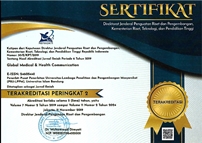The Impact of Social Value Orientation on Pro-environmental Behavior
Abstract
Promoting pro-environmental behavior is a significant concern nowadays. Researchers have identified social value orientation as one of the key factors influencing pro-environmental behavior. This study aims to investigate the influence of social value orientation on pro-environmental behavior and to highlight differences based on gender. The research method used is non-experimental quantitative causality. This research was carried out in 2024 at B University in Bandung. The study participants were 378 students from B University in Bandung, selected using convenience sampling. The measurement tools used were the Triple Dominance Scale by Van Lange (1998) to assess social value orientation (SVO) tendencies and the GEB Scale by Kaiser (2020) to measure general ecological behavior, i.e., the tendency to engage in pro-environmental or non-pro-environmental behavior. Data analysis was done using JASP version 19. The results showed a significant influence of social value orientation on pro-environmental behavior with Fisher's exact test p=0.017 (p<0.05). An odds ratio of 0.084 was obtained, indicating that participants categorized as pro-social are 11.9 times more likely to engage in pro-environmental behavior than those classified as pro-self. Regarding gender differences, the chi-square test revealed no significant differences between males and females in terms of social value orientation tendencies with χ2=0.056 (p>0.05), as well as in terms of engaging in pro-environmental behavior, with χ2=0.774 (p>0.05). The conclusions of this study are that social value orientation affects pro-environmental behavior, and there was no significant difference between gender in social value orientation tendencies and pro-environmental behavior.
Keywords
Full Text:
PDFReferences
Quadrado GP, Dillenburg SR, Goulart ES, Barboza EG. Historical and geological assessment of shoreline changes at an urbanized embayed sandy system in Garopaba, Southern Brazil. Reg Stud Mar Sci. 2021;42:101622.
Wakkee I, van der Sijde P, Vaupell C, Ghuman K. The university’s role in sustainable development: activating entrepreneurial scholars as agents of change. Technol Forecast Soc Change. 2019;141:195–205.
Shafiei A, Maleksaeidi H. Pro-environmental behavior of university students: application of protection motivation theory. Glob Ecol Conserv. 2020;22:e00908.
Kurisu K. Pro-environmental behaviors. Tokyo: Springer Japan; 2015.
Bakker DM, Dijkstra J. Comparing the slider measure of social value orientation with its main alternatives. Soc Psychol Q. 2021;84(3):235–45.
Curtin D, Jia F. Revisiting social value orientations and environmental attitude–identity–intention in decomposed games. Int J Environ Res Public Health. 2022;19(12):6961.
Bhattacharya H. Do pro-social students care more for the environment? Int J Sustain High Educ. 2019;20(4):761–83.
Iwai T, Tavares GM. When prosocial motives matter most: the interactive effects of social value orientation, message framing, and helping costs on helping behavior. J Behav Decis Mak. 2024;37(2):e2384.
Lee YK, Kim S, Kim MS, Choi JG. Antecedents and interrelationships of three types of pro-environmental behavior. J Bus Res. 2014;67(10):2097–105.
Zibenberg A, Greenspan I, Katz-Gerro T, Handy F. Environmental behavior among Russian youth: The role of self-direction and environmental concern. Environ Manag. 2018;62(2):295–304.
Liobikienė G, Liobikas J, Brizga J, Juknys R. Materialistic values impact on pro-environmental behavior: the case of transition country as Lithuania. J Clean Prod. 2020;244:118859.
Palupi T, Sawitri DR. The importance of pro-environmental behavior in adolescent. E3S Web Conf. 2018;31:09031.
Schultz PW, Nolan JM, Cialdini RB, Goldstein NJ, Griskevicius V. The constructive, destructive, and reconstructive power of social norms: reprise. Perspect Psychol Sci. 2018;13(2):249–54.
Marcus K. The fundamental role of large-scale trust building in natural resource management. Environ Values. 2016;25(3):259–86.
Agissova F, Sautkina E. The role of personal and political values in predicting environmental attitudes and pro-environmental behavior in Kazakhstan. Front Psychol. 2020;11:584292.
De Groot JIM, Thøgersen J. Values and pro-environmental behaviour. In: Steg L, De Groot JIM, editors. Environmental psychology: an introduction. 2nd Edition. Hoboken: John Wiley & Sons Ltd; 2019. p. 167–178.
Grosch K, Rau HA. Gender differences in honesty: the role of social value orientation. 2017. J Econ Psychol. 2017;62:258–67.
artínez-Gregorio S, Tomás JM, Oliver A. A psychometric study of the prosocial behavior scale: differential item functioning by gender. Behav Sci (Basel). 2023;13(3):259.
spinosa MP, Kovářík J. Prosocial behavior and gender. Front Behav Neurosci. 2015;9:88.
ien YH, Huang J. Gender differences in pro-environmental behavioral intentions, environmental values, tolerance of environmental protection cost, and confidence in citizen participation in environmental policies during the COVID-19 pandemic in Taiwan. Pol J Environ Stud. 2023;32(5):4813–23.
Li Y, Wang B, Saechang O. Is female a more pro-environmental gender? Evidence from China. Int J Environ Res Public Health. 2022;19(13):8002.
Sari AQ, Sukestiyarno YL, Agoestanto A. Batasan prasyarat uji normalitas dan uji homogenitas pada model regresi linear. UJM. 2017;6(2):168–77.
Kaiser FG. GEB-50. General Ecological Behavior scale. Trier, Germany: Leibniz Institute for Psychology; 2020 [cited 2024 July 20]. Available from: https://www.testarchiv.eu/en/test/9004402.
Pronello C, Gaborieau JB, Rappazzo V, Operti V. Case study on effects of the mandatory validation on bus commercial speed. EJTIR. 2019;19(1):43–59.
Bogner FX, Suarez BR. Environmental preferences of adolescents within a low ecological footprint country. Front Psychol. 2022;13:894382.
Balundė A, Perlaviciute G, Truskauskaitė-Kunevičienė I. Sustainability in youth: environmental considerations in adolescence and their relationship to pro-environmental behavior. Front Psychol. 2020;11:582920.
Arnold O, Kibbe A, Hartig T, Kaiser FG. Capturing the environmental impact of individual lifestyles: evidence of the criterion validity of the general ecological behavior scale. Environ Behav. 2018;50(3):350–72.
Kovács B, Carroll GR, Lehman DW. Authenticity and consumer value ratings: empirical tests from the restaurant domain. Organ Sci. 2013;25(2):458–78.
Otto S, Kröhne U, Richter D. The dominance of introspective measures and what this implies: the example of environmental attitude. PLoS One. 2018;13(2):e0192907.
Markle GL. Pro-environmental behavior: does it matter how it’s measured? Development and validation of the pro-environmental behavior scale (PEBS). Hum Ecol. 2013;41(6):905–14.
pISSN 2301-9123 | eISSN 2460-5441
Visitor since 19 October 2016:
Global Medical and Health Communication is licensed under a Creative Commons Attribution-NonCommercial-ShareAlike 4.0 International License.































.png)
_(1).png)
_(1).jpg)
